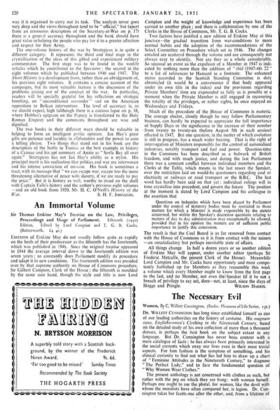An Immortal Volume
Sir Thomas Erskine May's Treatise on the Law, Privileges,
EDITIONS of Erskine May do not usually follow quite as rapidly on the heels of their predecessor as the fifteenth has the fourteenth, which was published in 1946. Since the original treatise appeared in 1844 the average interval down to the fourteenth edition was seven years ; so constantly does Parliament modify its procedure and adapt it to new conditions. The fourteenth edition was presided over by that supreme authority on House of Commons procedure, Sir Gilbert Campion, Clerk of the House ; the fifteenth is moulded by the same sure hand, though the style and title is now Lord Campion and the weight of knowledge and experience has been carried to another place ; and there is collaboration by one of the Clerks in the House of Commons, Mr. T. G. B. Cocks.
Two factors have justified a new edition of Erskine May at this juncture—the gradual transition from war-conditions to more normal habits and the adoption of the recommendations of the Select Committee on Procedure which sat in 1946. The changes entailed are scattered through the volume and are consequently not always easy to Identify. Nor arc they as a whole considerable. So unusual an event as the expulsion of a Member in 1947 is indi- cated by nothing more than the addition of "ibid (1947-48) 22 " to a list of references to Hansard in a footnote. The enhanced status accorded to the Scottish Standing Committee is duly chronicled (it would be a convenience if that body appeared under its own title in the index) and the provisions regarding Private Members' time are expounded as fully as is possible at a moment when the Private Member is still engaged in recovering the totality of the privileges, or rather rights, he once enjoyed on Wednesdays and Fridays.
Much of the procedure of the House of Commons is esoteric. The average elector, closely though he may follow Parliamentary business, can hardly be expected to appreciate the full importance of Supply Days or the significance in the increase of their number from twenty to twenty-six (before August 5th in each session) effected in 1947. But one question, in the matter of which evolution is still in progress, has a much wider bearing. That is the right of interrogation of Ministers responsible for the control of nationalised industries, notably transport and fuel and power. Question-time in the Commons has been described as a bulwark of British freedom, and with much justice, and during the last Parliament there was a constant conflict between individual members and the Clerks at the Table, which means in the last resort the Speaker, over the restriction laid on would-be questioners regarding coal or electricity or railways or road transport or the B.B.C. The last word has hardly been said on that yet ; individual rulings will in time crystallise into precedent, and govern the future The position at the moment is stated by Lord Campion and his colleague in the assertion that Questions on industries which have been placed by Parliament under the control of statutory bodies must be restricted to those matters for which a Minister is made responsible by the statute concerned, but within the Speaker's discretion questions relating to matters of day to day administration may exceptionally be allowed, provided that in his opinion the matters are of sufficient public importance to justify this concession.
The result is that the Coal Board is as far removed from contact with the House of Commons as it is from contact with the miners —an unsatisfactory but perhaps inevitable state of affairs.
All things change. In half a dozen years or so another edition of Erskine May will appear, under another editor (perhaps Sir Frederic Metcalfe, the present Clerk of the House). Meanwhile Lord Campion and Mr. Cocks have opportunely and most compe- tently furbished up for Members as they reassemble this week a volume which every Member ought to know from the first page to the last, and no Member, not even the4Speaker (if it be not a breach of privilege to say so), does—not, at least, since the days of






































 Previous page
Previous page